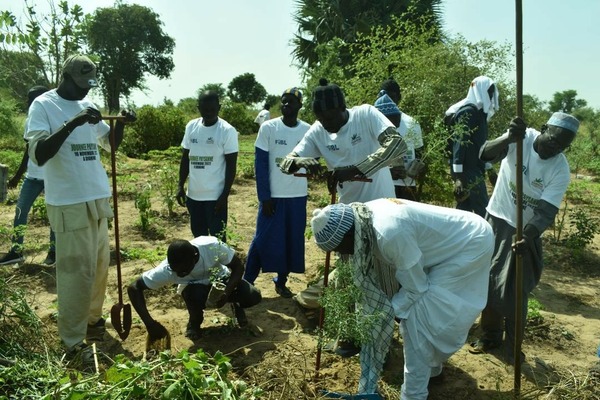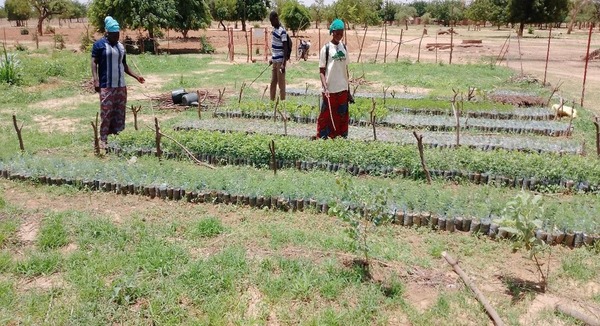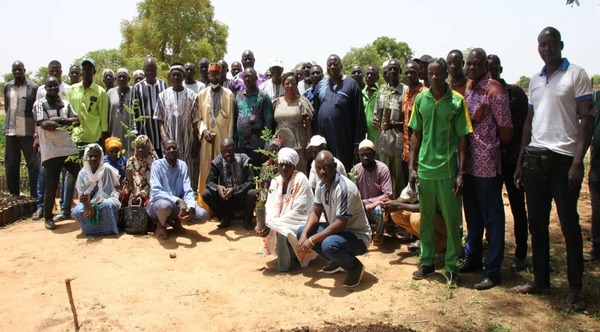Introduction
While SustainSahel (2020-2025) concentrates on enhancing the scientific understanding of a wide variety of agroecological techniques and at the same time deepening research cooperation between African and European scientists and institutions in the West African semi-arid zones, DAAPS activities (2022 and 2023) strengthened connections between scientists, farmers’ organizations, and local communities within the SustainSahel framework. Most significantly the DAAPS initiative, sponsored by Swiss philanthropist Daniel Brunner, introduced Non-Governmental Organizations (NGOs) as new project partners, enhancing the project's capacity for on-the-ground change and fostering collaboration within the consortium. The initiative was locally coordinated by Agrisud in Senegal[1], AMSD[2] in Mali and Tiipaalga[3] in Burkina Faso.
Educational food fairs in rural areas
In the three countries, DAAPS organized educational food fairs in rural areas, farmers’ trainings, video-screening sessions in rural areas, awareness-raising sessions for farmers, and enabled the implementation and management of 20 tree nurseries. The fairs mobilized more than 2,000 people in a total of 12 events - two events in each country annually. The food fairs lasted a whole day and let farmers, extensionists, researchers, NGO officials and local authorities come together to learn and discuss about agroecological and agroforestry practices adapted to the Sahelian context.
During the fairs, innovative approaches, such as theatrical performances and practical demonstrations of agroecological innovations, were used as low-threshold means of dissemination. Farmers enjoyed learning in an entertaining way, for example with theatre plays recreating farmers’ hardships and how their lives changed when they had come across low capital-input agroecological solutions. Other examples were practical demonstrations of agroecological innovations, such as the production of a biopesticide made of local ingredients, or the production of bokashi compost. Music and dance were thus an integral part of the program.
The educational food fairs included a section with stands that showcased local food products from agroforestry systems, and the participants were offered a meal made of local organic ingredients. The events also provided an opportunity for networking, with new contacts established between researchers, farmers’ organizations, and NGOs. During a ceremony at the end of the fair, a selection of recommended tree seedlings were presented to choose from, so that the participating farmers would not “only” take new knowledge and ideas back to their farms.
79,461 trees planted in Senegal, Mali and Burkina Faso
DAAPS trained 284 farmers as nursery caretakers in the three countries, and coached the implementation of four mid-range tree nurseries in Burkina Faso and two in Mali, as 15 small nurseries in farmers’ fields in Senegal. The management of the nurseries was carried out by the farmers and followed up by the initiative. Besides the training, the DAAPS initiative provided the necessary equipment, seeds, fencing, and, in the case of Senegal, the digging of wells to provide water to the trees. The two years of the DAAPS initiative developed the farmers’ capacity to master the tree-producing techniques, specifically enabling them to continue their venture after the end of the project. We expect this to not only generate income for the household but also to produce much-needed tree seedlings to help better the farms´ productivity and to reforest the local landscapes.
During the timeline of the initiative, the trees produced in the nurseries were acquired by DAAPS and distributed to farmers. Collective tree planting actions were organized in different villages, and a total of 79,461 trees were planted during the course of the initiative in the three countries.
Video screenings with smart projectors
The local teams of Mali and Burkina Faso organized cinema sessions in rural areas to screen agricultural educational videos, which provided a good platform for debate about several agroecological practices. The featured videos focused on practices such as mulching, composting, soil fertility management and livestock-agriculture integration. The screenings were attended by nearly 1,700 farmers in several different villages in the two countries. The teams used smart projectors, an innovative new tool co-conceived by Access Agriculture[4]. “Smart projectors” make video-screenings in remote areas possible, since they are equipped with an integrated video database and a foldable solar panel to charge the battery, making it independent from the power grid.
The screening sessions proved to be a very useful “icebreaker” for open discussions with the farmers (women and men alike), and for example, inspired many to try mulching with crop residues and bush cuttings in part of their fields. The videos have also been useful in raising awareness of farmers regarding the importance of trees on farms and in the landscape, especially for biodiversity, soil health, and the water cycle.
The DAAPS initiative facilitated meaningful and respectful collaboration between NGOs, farmers, and research institutions, hopefully bringing along enduring benefits for Sahelian agroforestry systems. The engagement of farmers and the substantial tree planting efforts are expected to have lasting positive impacts, complementing the broader goals of the SustainSahel project.






 tap and then scroll down to the Add to Home Screen command.
tap and then scroll down to the Add to Home Screen command.